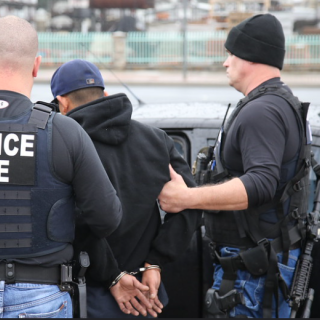BANGKOK, Thailand -- Thailand's democracy activists, angered by Hong Kong's police brutality, joined an international "Mulan" boycott which expanded after Disney thanked China's security forces for help with filming in a desert where one million Uighurs and other Muslims are imprisoned or suffer other rights violations.
"It just keeps getting worse!" Hong Kong's leading activist Joshua Wong tweeted.
"Now when you watch #Mulan, not only are you turning a blind eye to police brutality and racial injustice -- due to what the lead actors stand for -- you're also potentially complicit in the mass incarceration of Muslim ethnic Uighurs. #BoycottMulan," Mr. Wong said.
"We have still not forgotten that Mulan's leading actress supported the police use of violence against Hong Kong protesters who fight for freedom and democracy,” announced prominent Thai student activist Netiwit Chotiphatphaisal.
"I would like to invite everybody to #BoycottMulan, #BanMulan, so that Disney and the Chinese government realize that state violence against the people is something that cannot be accepted," Mr. Netiwit, 23, said on Twitter resulting in tens of thousands of online likes and shares.
During the past few days, Hong Kong's police have clashed with thousands of protesters and detained more than 90, chasing, beating and arresting some of them for allegedly obstructing and assaulting police.
Those protests opposed a recent cancellation of a local election, China's imposition of a harsh national security law in July, and other anti-democracy policies in semi-autonomous Hong Kong.
The boycott began when dual U.S.-Chinese citizen Liu Yifei -- who stars as Mulan's Chinese female warrior -- shared an online statement from Beijing's government-controlled People’s Daily media in August.
"I also support Hong Kong police. You can beat me up now," the media's statement said in Chinese.
Ms. Liu mirrored the statement by posting: "I also support Hong Kong police."
Her post came at the height of Hong Kong's police crackdown against months of often violent street confrontations.
Mr. Wong denounced Ms. Liu as a "Cop Backer."
Mr. Wong's post was retweeted by Nathan Law, 27, a Hong Kong democracy activist who fled to London in July fearing arrest. Mr. Law's Twitter account has more than 240,000 followers.
Mr. Law also retweeted Mr. Netiwit's post, including photos of Thais holding "#BanMulan" signs in a Bangkok movie theater after Disney's $200 million production opened here on Sept. 4.
When Hollywood Reporter asked Beijing-based Ms. Liu about supporting Hong Kong's police, she replied:
"I think it's obviously a very complicated situation and I'm not an expert. I just really hope it gets resolved soon."
In the film's closing credits, The Walt Disney Co. gave "Special Thanks" to China's Bureau of Public Security (PSB) in Turpan, Xinjiang province, where dramatic desert battles take place.
Those credits were publicly seen for the first time when the live-action remake of "Mulan" was released on September 4.
"Disney explicitly thanks the Public Security Bureau of Turpan municipality for their help in making Mulan," tweeted Australian Strategic Policy Institute researcher Nathan Ruser.
"Turpan PSB runs at least 14 detention facilities that are designed to extrajudicially detain minorities," targeting mostly Muslim Uighurs along the ancient Silk Road.
"The size of Xinjiang's re-education camp network has more than doubled in the last year," Mr. Ruser said.
"From first-hand testimony to satellite imagery, researchers have now provided empirical data that authoritatively paints a picture of the extent of China’s biggest human rights abuse since the 1989 post-Tiananmen purge," the institute said.
Disney's film credits also thanked the "publicity department of CPC [the Communist Party of China] Xinjiang Uighur Autonomy Region Committee.
That department churns out government-produced propaganda about how wonderful life is in Xinjiang and what Beijing is doing to improve everyone's life there.
The film's production designer Grant Major, "who previously worked on 'The Meg' and 'Crouching Tiger Hidden Dragon 2' in China, along with set decorator Anne Kulijan and the rest of the [Mulan] production team, spent months in and around the northwest province of Xinjiang to do legwork research before the cameras rolled," Architectural Digest reported.
"Chinese academics were consulted as well," the magazine said.
"It’s a Disney movie, so everything should look romanticized and family-friendly," Mr. Major said.
"It’s a girl-power film."
New York-based Asia Society senior fellow Isaac Stone Fish tweeted:
"What's wrong with thanking Xinjiang? Well, more than a million Muslims in Xinjiang, mostly of the Uighur minority, have been imprisoned in concentration camps.
"Disney worked with regions where genocide is occurring, and thanked departments that are helping implement it," Mr. Fish said.
The international boycott coincides with Washington-based Wilson Center's live public webcast scheduled for Sept. 11 about "The Politics of a New Mulan," sponsored by the Kissinger Institute on China and the United States.
"The film was released in September of 2020 [and] its bad guys -- the Mongolians -- are being told [in real life] their children couldn’t study in their mother tongue within China," the Wilson Center said.
Protesters in China's autonomous Inner Mongolia oppose a new Mandarin Chinese language curriculum, fearing it will erode their culture.
Christiana Aguilera, who sings "Reflection" on Mulan's soundtrack, told her 17 million Twitter followers:
"I see myself in Mulan in the sense that I've always been a Fighter -- for and defending truth and meaning, even in the face of fear, self doubt and backlash."



